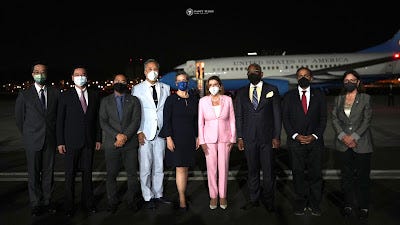China, Taiwan and the USA
By Luis Fierro Carrion (*)
Twitter: @Luis_Fierro_C
The visit of the Speaker of the United States House of Representatives, Nancy Pelosi, to Taiwan has raised a hornet's nest.
The People's Republic of China (PRC) has criticized the visit, has warned that the US is "playing with fire", and has launched a series of "military exercises" in the strait that separates Taiwan from mainland China.
China's communist government seized power in a revolution that culminated in 1949. Leading the victorious Chinese Communist Party was Mao Zedong, who waged a civil war against the nationalist Kuomintang government led by Generalissimo Chiang Kai-shek. The nationalist army took refuge on the island of Taiwan, where it maintained a dictatorial regime until the 1990s, when a multiparty democracy was established.
The "Republic of China" (official name of the island) maintained the representation of China in the United Nations until 1971, when the UN recognized the PRC instead. Gradually, the countries that recognized Taiwan dwindled, down to 14. It participates unofficially in entities such as the World Trade Organization, the Asian Development Bank and the International Olympic Committee (as "China Taipei").
The US established an alliance with Taiwan, and was in a de facto war against Chinese "volunteers" during the Korean War (following North Korea's invasion of South Korea), between 1950 and 1953.
China attacked some of the Taiwanese islands closest to the mainland with artillery fire in 1958, but failed to take control of any territory.
In 1979, the US changed its recognition to the PRC as well, and signed a "One China Policy." However, it maintained a "strategic ambiguity" as to whether it would defend Taiwan in the event of a Chinese attack. The US also signed the "Taiwan Relations Act", which stated that it was its expectation that the future of Taiwan would be defined in a peaceful manner, and that it would sell weapons to Taiwan so that it could defend itself.
During his government, Trump spoke by phone with the President of Taiwan, Tsai Ing-wen (of the Democratic Progressive Party, which seeks greater sovereignty), promoted the visit of officials and the sale of weapons.
President Biden, in erratic statements, said that the US would intervene in defense of Taiwan (violating the notion of “strategic ambiguity”), although he later confirmed to President Xi that the US would not support a change in the status quo or unilateral actions.
All this occurs in the context of the Russian invasion of Ukraine. China is looking into the sanctions imposed on Russia, which have severely affected the Russian economy. However, given the close economic integration between China and the West, it would be difficult to establish similar sanctions against China.
The economist Noah Smith established a comparison between the "Western" alliance (NATO plus Japan) against a potential Sino-Russian axis, and concluded that it would be the most even conflict between alliances, in economic terms, industrial capacity and military force (https: //noahpinion.substack.com/p/the-war-economy-sizing-up-the-new). A worrying factor is that China concentrates the mineral processing capacity that is key to the new technologies: copper, lithium, nickel, cobalt and rare earths.
A direct conflict would be unthinkable because they are nuclear powers.
(*) Translation of my column published in Diario "El Universo" on August 2, 2022.
https://www.eluniverso.com/opinion/columnistas/china-taiwan-y-ee-uu-nota/




